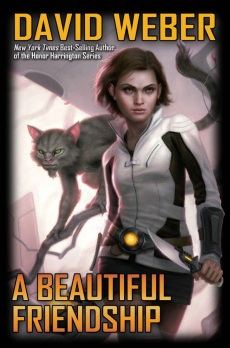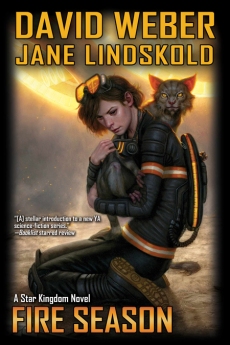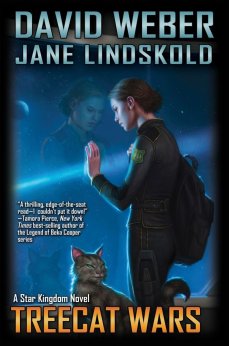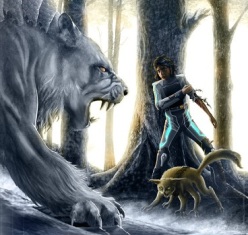 A few years ago, I read A Beautiful Friendship by David Weber. It’s really two novellas in one; the first was originally one of three in Worlds of Honor, the first Honorverse anthology; that novella (also titled “A Beautiful Friendship”) detailed the first meeting of a human and a treecat, the latter being the native sentient species of the planet Sphinx, fifteen hundred years in the future. The second half of the novel version deals with the immediate fallout of the story.
A few years ago, I read A Beautiful Friendship by David Weber. It’s really two novellas in one; the first was originally one of three in Worlds of Honor, the first Honorverse anthology; that novella (also titled “A Beautiful Friendship”) detailed the first meeting of a human and a treecat, the latter being the native sentient species of the planet Sphinx, fifteen hundred years in the future. The second half of the novel version deals with the immediate fallout of the story.
While the original short story was aimed at regular readers of Weber’s Honor Harrington series, the novel version began a new spin-off series (taking place four centuries before the main series) that was being marketed as YA. This summer, I read the next two books in the series, co-authored by Jane Lindskold: Fire Season and Treecat Wars.
The series almost manages to be stand-alone with regards to the main Honorverse books; I say almost, because I feel there’s something a bit lacking to it. Unfortunately, to explain why, I have to describe some of the parent series.
In the first novel set in this universe, On Basilisk Station, we’re introduced to the character of Commander Honor Harrington, Royal Manticoran Navy, captain of the light cruiser HMS Fearless. She is a promising tactician, a natural leader, and the unfortunate victim of politics as she and her ship are swept under the rug and out to the Basilisk system in a vain attempt to avoid an admiral further embarrassment. She is loosely based on both the real-life Lord Admiral Nelson and the fictional Horatio Hornblower, and the series is a delightful mix of Napoleonic-era nautical swashbuckling fun and high-tech military science fiction adventure, with a fair dash of strangely-appealing political thriller tossed in for seasoning. If you’re a fan of military science fiction, chances are you’ve already read it.
However, at the same time we meet Honor Harrington (and technically before her name is even mentioned), we’re introduced to Nimitz the treecat. Nimitz is a six-limbed furred arboreal creature with a prehensile tale who looks like a cross between a cat and a weasel, has a wide understanding of the English language even if he can’t speak, and a little-understood (by humans) empathic and possibly telepathic sense. Treecats are social creatures and rarely leave their clans (which are rarely visited or even witnessed by outsiders who are not part of the Sphinx Forestry Service) except for the rare example who psychically bonds with a human. Treecat-human bonds are nearly inseparable, and they experience mental and even physical pain when they are separated.
However, even after four hundred years of contact and coexistence, there is much that humans don’t know about treecats. They’re considered sentient creatures by law, but how sentient? What is the extent of their mental capabilities? What do they truly think of humans? And why is every last treecat addicted to celery?
In the fourth novel, Field of Dishonor, Honor is having dinner with several other characters and reveals that one of her ancestors, Stephanie Harrington, was the first person to discover the existence of treecats (and incidentally solving the mystery of the missing celery), rather soon after Sphinx (the second of three habitable planets in the Manticore binary system) was settled. When the first Honorverse anthology was published, Weber finally got a chance to tell that story from young Stephanie’s perspective . . . and, for the first time, fans got a look at the world from a treecat’s perspective.
 In A Beautiful Friendship, we get to know treecats like we haven’t had a chance to in the main series, though in Ashes of Victory . . . well . . . spoilers. You’ll just have to read that for yourself. But as we continue with the Star Kingdom spin-off series, we can see life through the eyes of Climbs Quickly (dubbed Lionheart by Stephanie) as he gets to know the strange two-legs who have come to his clan’s territory. It’s not until the third book, Treecat Wars, that he (and by extension the other treecats) can confirm that the two-legs don’t just come from a far-off land, but from the stars themselves.
In A Beautiful Friendship, we get to know treecats like we haven’t had a chance to in the main series, though in Ashes of Victory . . . well . . . spoilers. You’ll just have to read that for yourself. But as we continue with the Star Kingdom spin-off series, we can see life through the eyes of Climbs Quickly (dubbed Lionheart by Stephanie) as he gets to know the strange two-legs who have come to his clan’s territory. It’s not until the third book, Treecat Wars, that he (and by extension the other treecats) can confirm that the two-legs don’t just come from a far-off land, but from the stars themselves.
One of the hardest things to do when describing another species observing us humans is to avoid irony. Weber and Lindskold don’t quite manage it, but they come very close; and what irony is there is played with quite deliberately. You can truly get the feel of an alien perspective as they observe humans, yet balanced with enough familiar elements that you can still comprehend them. That gets stronger when Lindskold takes over the majority of the writing, as she brings in additional elements such as forestry knowledge (Stephanie joins the Sphinx Forestry Service) and a fair amount of comparative anthropology (scientists arrive to study the treecats and determine if they are truly sentient beings on par with humans, or simply very smart animals). The human-POV conversations give the reader insight into the treecats’ POV, and vice versa. It’s an excellent balance, especially for a YA audience.
Now, I said that the series didn’t quite stand alone. That’s in part because of how much we get to see of the treecats. It’s very hard to grasp that four hundred years will pass between these books and the main series, and yet even bonded humans still lack an understanding of treecat culture and thought. You have to read eight and a half books of the main series to understand why, and I wonder how frustrating that might be for someone who has never read the other books. However, I know that one person (Elizabeth) has read the first book and enjoyed it, and did not read the main series.
 Another failing is that the Star Kingdom series doesn’t spend much time explaining the nature of the Star Kingdom itself; you’d expect it to, with a name like that. Little to no explanation is given for why the binary system is run by a British-style constitutional monarchy, and it doesn’t take much space to explain it (Zahn did it in about a page in another spin-off prequel novel, A Call to Duty, which I’ll review soon as well; this was the best, most concise explanation in the entire series, even over Weber’s own writing). There is little to no explanation of why it’s not considered a good idea to reveal that Stephanie’s family has had genetic tweaking to adapt to high-gravity worlds; that took a lot of books even in the main series. And while there’s no need in the context of this series to explain the details of interstellar space travel, the reader has no explanation of the outside galaxy beyond it being there. Even the main series, which dealt very little with worlds not immediately relevant to the plot, still gave a distinct impression that there was a vast and populated universe out there.
Another failing is that the Star Kingdom series doesn’t spend much time explaining the nature of the Star Kingdom itself; you’d expect it to, with a name like that. Little to no explanation is given for why the binary system is run by a British-style constitutional monarchy, and it doesn’t take much space to explain it (Zahn did it in about a page in another spin-off prequel novel, A Call to Duty, which I’ll review soon as well; this was the best, most concise explanation in the entire series, even over Weber’s own writing). There is little to no explanation of why it’s not considered a good idea to reveal that Stephanie’s family has had genetic tweaking to adapt to high-gravity worlds; that took a lot of books even in the main series. And while there’s no need in the context of this series to explain the details of interstellar space travel, the reader has no explanation of the outside galaxy beyond it being there. Even the main series, which dealt very little with worlds not immediately relevant to the plot, still gave a distinct impression that there was a vast and populated universe out there.
All of this creates a weakness for the series, since it almost assumes that any reader has already read the main series, which defeats the purpose of a YA “introduction” to the setting. However, in the end, these are mild nitpicks and the series can be enjoyed by readers unfamiliar with the larger details (though they might find themselves wanting to read the rest of the Honorverse, which isn’t really a bad thing as far as I’m concerned).
The final issue that disappointed me a little (though it’s easily ignored for a good book) is that Fire Season and Treecat Wars get a bit preachy when it comes to forestry and conservation. However, it’s not trying to push a political agenda, and seems to be more about Lindskold wanting to share interesting details on the subject and accidentally sounding like a Smokey the Bear PSA.
Content Concerns
With any YA novel, especially with the sort of audience I get here at Novel Ninja, I have to cover sexual and violent content.
The main series describes a world where casual sex is considered a given (though the main character, Honor, does not engage in one-night stands by any stretch of the imagination). This is not ignored in the Star Kingdom series, as Stephanie and her boyfriend fumble through the awkwardness of teenage romance. Stephanie hasn’t slept with anyone as of the third book, but I can’t guarantee that to stay as-is. Also, considering that Stephanie Harrington is Honor Harrington’s great-something grandmother, I have to assume that Stephanie never marries or at least never takes her husband’s name. (Manticoran society still uses the Western custom of a wife taking the husband’s name, at least in hyphenated form.) However, if this concerns you, your child has probably already been exposed to the facts of life from many directions.
 Violence is fairly low-key; unlike the main series, this isn’t a military story and (except once) Stephanie herself never gets into a violent situation with another human. There are plenty of animal dangers, though. As one example, A Beautiful Friendship has her using a small knife to hold off a large alien predator called a hexapuma, which the treecats call a death fang, in order to protect a wounded Climbs Quickly; the Bright Water Clan, observing this, names her Death Fang’s Bane. As you might guess from the title, Treecat Wars involves some deadly conflicts between treecat clans as a result of the events of Fire Season. You’ll find far more objectionable violence for young minds in a typical TV show.
Violence is fairly low-key; unlike the main series, this isn’t a military story and (except once) Stephanie herself never gets into a violent situation with another human. There are plenty of animal dangers, though. As one example, A Beautiful Friendship has her using a small knife to hold off a large alien predator called a hexapuma, which the treecats call a death fang, in order to protect a wounded Climbs Quickly; the Bright Water Clan, observing this, names her Death Fang’s Bane. As you might guess from the title, Treecat Wars involves some deadly conflicts between treecat clans as a result of the events of Fire Season. You’ll find far more objectionable violence for young minds in a typical TV show.
Audiobook
I also listened to the audio versions for Fire Season and Treecat Wars, narrated by Khristine Hvam. Hvam does a very good job of showing the multitude of accents in a setting where nearly everyone speaks English yet live on planets separated by months of travel, creating minute variations in the way people talk.
She even takes on a different cadence when narrating treecat POVs; though since she has all treecat mind-voices pitched high, it can sometimes be difficult to distinguish which treecat is talking at any given moment.
I think the audio is worth the price if you’ve got Audible credits to spend (though you might get it for cheaper if you get the Kindle ebook first). If audio isn’t your thing, though, you don’t need to go out of your way.
Overall, I’d say it’s an excellent series to give to a teen to interest him or her in some mild science fiction (especially if they like cats).

Two things:
1. It is explained in the “Main” books that Stephanie deliberately kept the Harrington name so that there would always be a Harrington living on the Harrington homestead and there was no one else to carry on the name but her.
2. According to David Weber on his own site their will be no more Treecat books, at least for the foreseeable future, due to lack of sales.
LikeLike
Well, that’s understandable, but still disappointing.
LikeLike
I agree it is disappointing that there is no more books for the foreseeable future, especially since the story progressed to the point where you finally saw the people pulling the strings in the background.
LikeLike